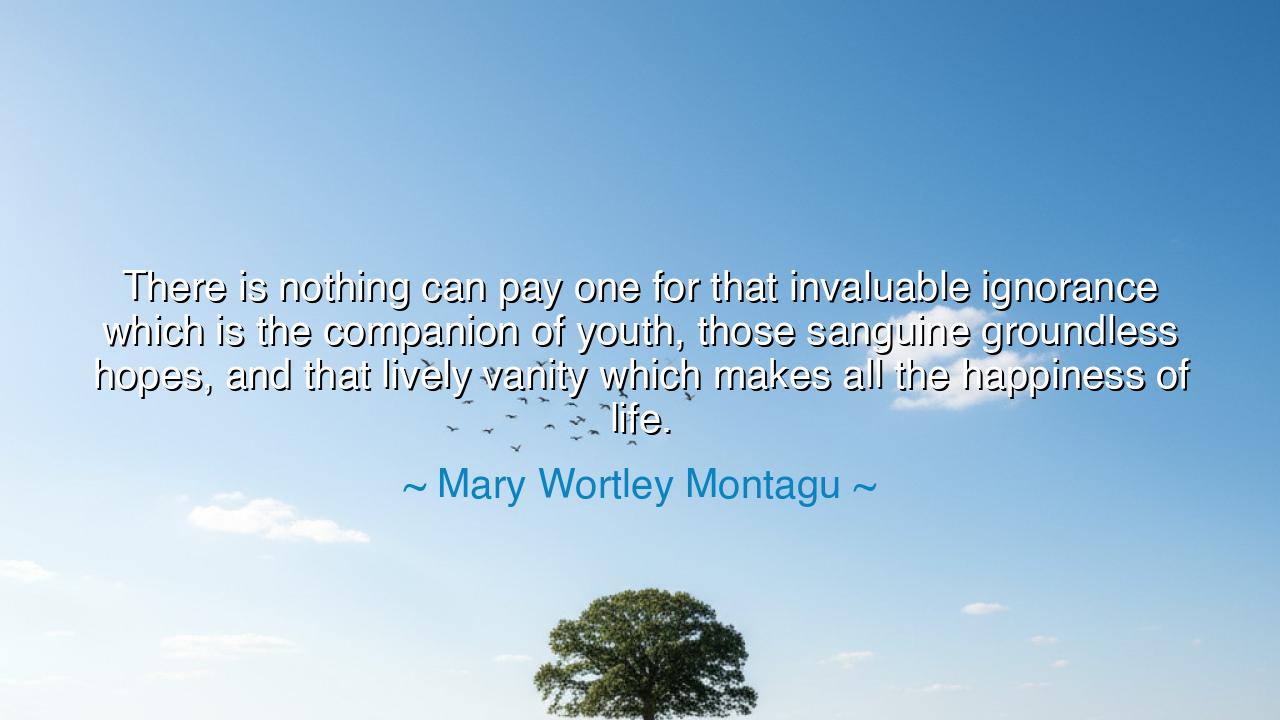
There is nothing can pay one for that invaluable ignorance which
There is nothing can pay one for that invaluable ignorance which is the companion of youth, those sanguine groundless hopes, and that lively vanity which makes all the happiness of life.






The words of Mary Wortley Montagu—“There is nothing can pay one for that invaluable ignorance which is the companion of youth, those sanguine groundless hopes, and that lively vanity which makes all the happiness of life”—speak with a wistful beauty that pierces both heart and memory. They come from a woman of great intellect and experience, who, having tasted the fullness of life, looked back with tenderness upon the radiant folly of her younger days. In her words lies the eternal truth that youth’s ignorance, though unwise, is sacred; that its hope, though groundless, is precious; and that its vanity, though fleeting, is the very pulse of life’s earliest joy.
In the ancient spirit, her reflection might have been uttered by an old philosopher watching the sunrise—knowing he will not see many more, yet smiling at the fervor of those who run headlong into the day. The ignorance of youth that Montagu praises is not the dullness of mind, but the blessed blindness that shields the young from despair. It is the divine veil that allows one to believe that all dreams are possible, that love will never fade, that time is endless. The wise may see clearly, but the young feel eternally. And sometimes, that illusion, that burning illusion, is what makes life most worth living.
Mary Wortley Montagu, a woman of letters, wit, and courage, lived in the 18th century—a time when women’s voices were often silenced, and yet hers rang with intelligence and boldness. She traveled, she wrote, she defied convention, and she knew both the ecstasies and the sorrows of the world. Her words are not those of naivety, but of nostalgia—the recognition that knowledge, though valuable, comes at a cost. She had exchanged the shining ignorance of youth for the sobering wisdom of age, and like many before and after her, she found that the bargain was fair but not sweet.
The ancients themselves lamented this truth. Euripides once wrote that wisdom comes through suffering, and indeed it does—but in its wake, something gentler is lost. The child who once believed the stars sang for her grows into the adult who understands they burn in silence. Yet Montagu reminds us that this loss, though inevitable, should be mourned with grace. The “sanguine, groundless hopes” of youth—those wild, unreasoned certainties that the world will yield to our desires—are not delusions to scorn, but fires that shape the spirit. Without them, humanity would never dare, never love, never build.
Consider the tale of Alexander the Great, who, before his thirtieth year, had conquered the known world. He was driven not by wisdom, but by that “lively vanity” Montagu describes—the radiant self-belief of youth. To the seasoned elder, his ambitions would have seemed madness, but to Alexander, they were destiny. Though his empire crumbled after his death, the legend of his dream endured for millennia. Thus, even when grounded in illusion, the passions of youth can move the world forward.
Montagu’s words also carry a quiet warning. She does not call us to reject knowledge, but to remember what it costs. In the pursuit of wisdom, we must not let our hearts grow cold. For happiness, she tells us, is not found in certainty, but in wonder. The young, though ignorant, live fully because they believe life is generous. The old, though wise, may falter because they know its limits. The secret, then, is to live with both hearts—to learn without losing awe, to see clearly without ceasing to dream.
So, dear listener, take this lesson to heart: cherish your innocent ignorance, your wild hopes, your bright vanities, for they are the breath of your spirit’s youth. Do not rush to cast them off in the name of reason. Let experience teach you, but let wonder guide you still. Dream, even when you know better. Hope, even when logic warns you otherwise. For Montagu’s wisdom is this: the soul that dares to believe in its own impossible brightness, even for a moment, holds a happiness that no age, no power, no wisdom can replace.
Thus, let us honor that sacred folly which once made our hearts so light. For though we cannot return to youth, we can keep its flame alive—by looking at the world not only as it is, but as it might yet be. And that, perhaps, is the greatest form of wisdom: to grow old without growing blind to beauty, to keep within us the “lively vanity” that once made all the happiness of life.






AAdministratorAdministrator
Welcome, honored guests. Please leave a comment, we will respond soon